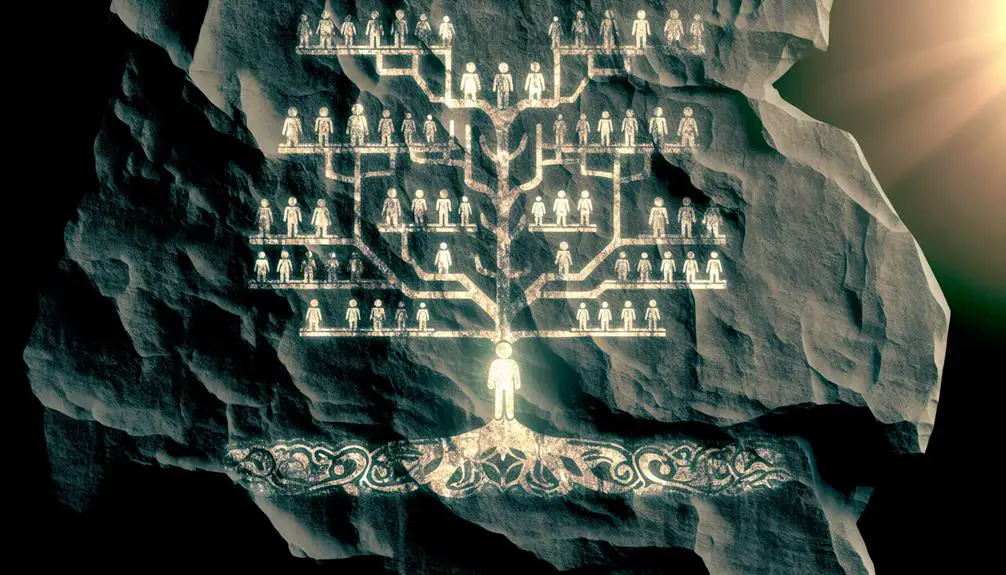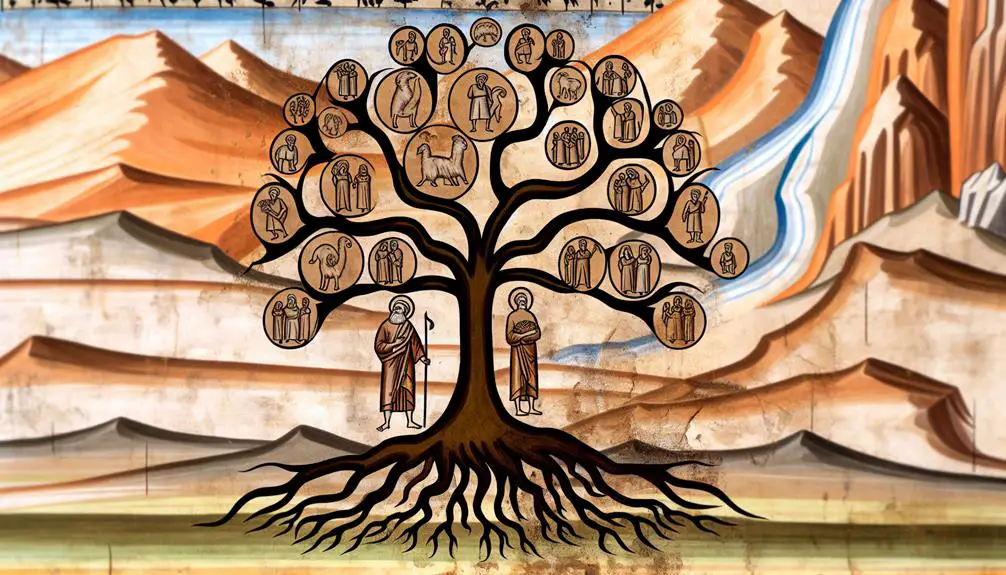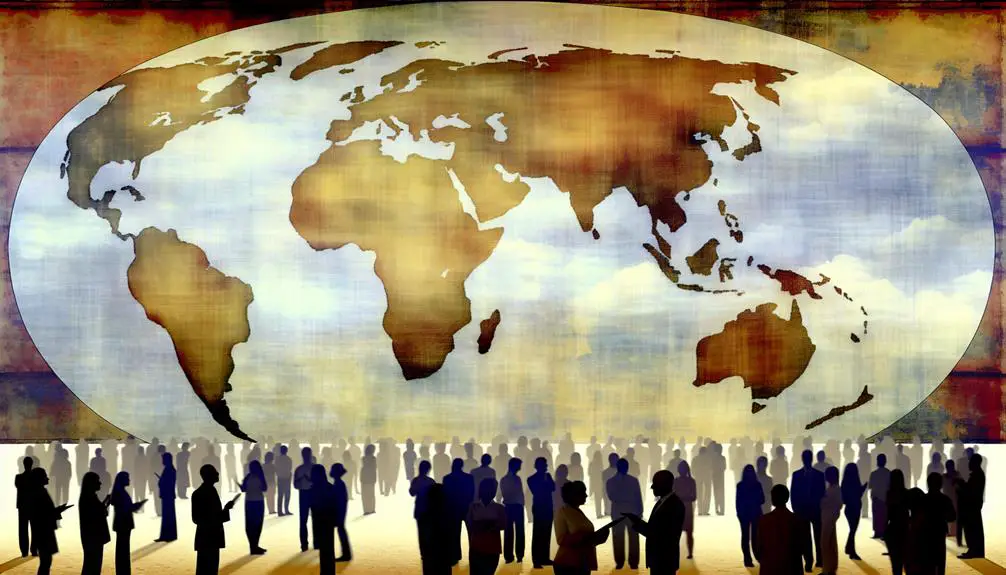Discover Peleg, a biblical figure whose name signifies Earth's division, and unravel the mysteries surrounding this pivotal event in ancient history.

Peleg in the Bible
Have you ever stumbled upon a name in the Bible and wondered about the story behind it?
Peleg is one such intriguing figure, nestled within the genealogies of Genesis.
You might find his name means 'division,' a term that hints at a significant event during his lifetime—the division of the Earth.
This brief mention in Scripture opens up a world of questions about what this division entails and its implications on biblical history and interpretations.
As you explore Peleg's lineage and the era he lived in, you'll uncover layers of meaning that could shed light on ancient narratives and their relevance today.
Why not take a closer look at this lesser-known biblical character and the mysteries his story may unravel?
Key Takeaways
- Peleg is a notable biblical figure symbolizing Earth's division, living 239 years.
- His name, meaning 'division' in Hebrew, reflects a significant historical event.
- A descendant of Shem and Eber, Peleg's lineage is integral to biblical genealogies.
- The era of Peleg marks a pivotal shift in geography and society, as per theological interpretations.
Who Was Peleg?

Peleg, a notable figure in the Bible, is best known for his time during which the Earth was divided. This division, often interpreted in religious texts, refers to significant geographical or linguistic changes. Peleg's longevity is a key aspect of his story, living for 239 years, a detail that highlights the long lifespans of early Biblical figures. This duration of life allows for a deeper understanding of the era's context and the events that unfolded.
Religious interpretations of Peleg's time are varied, but many agree that his life symbolizes a pivotal moment in human history. His name, which means 'division' in Hebrew, is thought to reflect the division of the earth's continents or the dispersal of its people into different languages and regions. This interpretation is supported by the lineage documented in the Bible, situating Peleg in the genealogy that traces humanity's spread across the planet.
Analyzing Peleg's significance requires a comprehensive look at both his longevity and the religious interpretations of his era. These aspects provide a window into understanding the early biblical narrative and its implications on human history and development.
The Meaning of Peleg
In exploring the significance behind the name 'Peleg,' one finds a rich tapestry of interpretations that delve into the pivotal moments of early human history. The name itself is steeped in ancient tradition, offering insights into the cultural and linguistic landscapes of the time.
Delving into the name etymology and linguistic origin of 'Peleg' reveals its roots in ancient Hebrew, where it's often translated to mean 'division' or 'split.' This interpretation isn't merely linguistic but also symbolic, reflecting a significant event or era in biblical accounts. Here are key aspects to consider:
- Name etymology: 'Peleg' is derived from the Hebrew verb 'palag,' which means to split or divide. This is indicative of the name's deeper connection to significant historical or mythological separations.
- Linguistic origin: The Hebrew origins of the name underscore its significance within the context of biblical narratives and the importance of language in understanding cultural heritage.
- Symbolic interpretation: Beyond its literal meaning, 'Peleg' symbolizes a period of division in human history, likely referring to events such as the division of the Earth's peoples or lands.
Understanding 'Peleg' from these perspectives provides a comprehensive view of its importance, both linguistically and historically.
Peleg's Family Lineage

Tracing back through the annals of biblical genealogy, we uncover that Peleg emerges from a lineage deeply embedded in the narrative of early human civilization. His genealogy, as recorded in the Scriptures, places him as a descendant of Shem, one of Noah's sons, situating him squarely within a heritage of significance and prophetic import. This connection not only highlights Peleg's importance but also sparks genealogical debates among scholars and theologians attempting to piece together the complex puzzle of ancient familial ties.
Peleg's father, Eber, lends his name to the Hebrews, indicating a pivotal role in ancestral traditions and the shaping of early Semitic identity. This lineage isn't merely a list of names; it represents the unfolding of divine intentions through generations, with Peleg standing as a crucial link in the chain. The discussions surrounding his genealogy delve into the intricacies of biblical narratives, exploring how kinship ties intertwine with the overarching themes of covenant and promise.
The exploration of Peleg's family lineage thus serves as more than an academic exercise; it's a journey into understanding how ancestral traditions and genealogical debates contribute to our comprehension of biblical history and the development of humanity's spiritual narrative.
The Era of Division
You've learned about Peleg's family lineage, now it's crucial to understand the significance behind his name and how it reflects on the era of division during his lifetime.
Peleg's name, often interpreted as 'division,' is closely tied to significant geographical changes reported in the Earth's history. This period marks a pivotal point, suggesting a shift that had lasting impacts on the landscape and human societies.
Peleg's Name Significance
Peleg's name, meaning 'division' in Hebrew, directly reflects the significant era of division during his lifetime, as documented in the Bible. This period is characterized by pivotal events, leading to a deeper understanding of not just the biblical narrative but also the cultural and linguistic context of ancient times. The importance of Peleg's name can be unpacked through:
- Name etymology: Analyzing the origins and meanings behind Peleg's name offers insights into the societal shifts happening during his era.
- Linguistic analysis: A closer look at the Hebrew language reveals the significance of naming in documenting historical and cultural changes.
- Biblical references: The mention of Peleg in the Bible serves as a cornerstone for understanding the era of division, highlighting the role of names in conveying thematic elements of the scriptures.
Earth's Geographic Changes
Building on the significance of Peleg's name, it's essential to explore the era of division marked by dramatic geographic changes on Earth as recorded in the Bible. This period is characterized by two main phenomena: continental drift and climate change.
Phenomenon |
Description |
Biblical Context |
|---|---|---|
Continental Drift |
The gradual movement of continents across Earth's surface. |
Implied during Peleg's era. |
Climate Change |
Significant and lasting changes in the Earth's climate. |
Linked to human actions and divine interventions. |
Era of Division |
A time marked by significant geological and climatic shifts. |
Symbolized by Peleg's name, meaning “division”. |
These changes had profound impacts on the Earth's geography, influencing the distribution of land and water, and altering the climate. This era of division underscores the dynamic and interconnected nature of our planet.
Interpretations of Earth's Division

The division of the Earth during Peleg's time has been subject to various interpretations, reflecting a complex interplay of historical, geographical, and theological factors. Scholars and theologians have dived deep into the narrative, trying to unravel the true meaning behind the text. The interpretations vary widely, but they generally fall into a few categories:
- Plate Tectonics: Some suggest that the division refers to a literal physical separation of the continents, possibly hinting at early understandings of plate tectonics. This view posits that the Earth's landmasses were once unified and began to drift apart during or before Peleg's lifetime.
- Cultural Diffusion: Others interpret the division metaphorically, as the spread of cultures and languages among humanity. This perspective sees the 'division' not as a physical separation but as the divergence of human societies and the establishment of distinct cultural identities.
- Theological Symbolism: A third group views the division in a theological light, indicating a divine intervention in human affairs that led to a significant change in the course of human history, possibly as a form of judgment or redirection.
Each of these interpretations offers a unique lens through which to view the account of Peleg, contributing to a richer understanding of the biblical narrative.
Peleg in Biblical Genealogies
Within biblical genealogies, Peleg emerges as a significant figure, marking a period of notable historical and theological implications. You'll find his name nestled within the family lines that trace the ancestry of key biblical characters, underscoring the importance of genealogical accuracy in understanding historical contexts and theological teachings.
Peleg's placement in these genealogies is not just a matter of record but sparks chronological debates among scholars and theologians. These discussions often revolve around the timing of events described in the Bible, especially in relation to the division of the Earth mentioned in connection with Peleg.
To illustrate the complexities and significance of Peleg's position within biblical genealogies, consider the following table:
Aspect |
Details |
|---|---|
Genealogical Position |
Direct descendant of Shem |
Significance |
Marks a pivotal moment in biblical history |
Debates |
Centers on chronological interpretations |
Implications |
Affects understanding of historical events |
Accuracy |
Critical for theological and historical analysis |
This table highlights the intricacies of genealogical accuracy and the ongoing debates that Peleg's mention in the Bible generates. It's a testament to the depth and complexity inherent in biblical studies, where every name and sequence carries weight and meaning.
Peleg's Legacy Today

Despite the passage of millennia, Peleg's legacy continues to resonate in contemporary discussions on biblical interpretations and theological implications. You'll find that modern interpretations of Peleg's story often focus on the depth and breadth of its genealogical relevance, providing a pivotal point for understanding biblical history and humanity's early stages.
Modern scholars and theologians debate the implications of Peleg's time, especially regarding the division of the Earth mentioned in his narrative. This discussion not only enriches our comprehension of biblical texts but also invites a broader conversation about the interplay between divine providence and human history. The genealogical relevance of Peleg serves as a cornerstone for tracing the lineage of significant biblical figures, offering insights into the interconnectedness of biblical narratives.
Key aspects of Peleg's legacy today include:
- Theological implications: His story prompts discussions on the nature of divine intervention and the significance of genealogies in biblical teachings.
- Historical context: Examining Peleg's place in history helps to contextualize other biblical events and figures.
- Cultural influence: Peleg's narrative influences how communities interpret their spiritual heritage and understand their place in a broader historical and theological landscape.
Through these lenses, Peleg's legacy remains a vibrant part of modern biblical scholarship and faith communities.
Frequently Asked Questions
How Has Peleg's Story Influenced Modern Culture or Art?
You mightn't realize it, but Peleg's story has subtly influenced modern culture and art. This inspiration can be seen in various forms, from pieces of art that are directly or indirectly influenced by his narrative to cultural festivals that incorporate themes or motifs from his story.
These manifestations offer a unique perspective on how ancient tales continue to shape our artistic expressions and cultural traditions, even when the original context isn't immediately apparent.
What Are Some Notable Archaeological Findings Related to the Era of Peleg?
Imagine unearthing secrets from ancient times, and among these, notable archaeological findings shed light on the era you're curious about. Researchers have discovered Peleg inscriptions and analyzed settlement patterns that provide a comprehensive view of how societies were organized.
These findings offer an analytical and objective lens into the past, revealing the intricacies of human civilization during that time. They're crucial for understanding the social and cultural dynamics of early communities.
Are There Any Contemporary Religious Groups or Sects That Particularly Revere Peleg?
You won't find many groups today specifically focusing on Peleg worship practices, as his story isn't central to mainstream religious teachings.
However, some sects might hold unique rituals or acknowledgments tied to his lineage or era, integrating these into broader worship practices.
These sect-specific rituals are rare and often blend with the overarching themes of their faith, making Peleg's reverence more of an exception than a widespread phenomenon.
How Do Different Translations of the Bible Treat Peleg's Story, and What Impact Do These Variations Have on Its Interpretation?
Ever wondered how translation can change a story? Different Bible versions offer varying linguistic nuances in Peleg's tale, affecting its interpretation significantly. These alterations not only influence the narrative's depth but also reshape genealogical interpretations.
Has Peleg Been Referenced in Recent Scientific Discussions or Theories About Ancient Human Migration and Settlement Patterns?
You might find it intriguing that recent scientific discussions about ancient human migration and settlement patterns have indeed referenced Peleg. Researchers delve into genetic markers and climate change impacts to understand these ancient movements better.
Conclusion
In wrapping up, Peleg's narrative isn't just a dusty chapter from ancient texts; it's a fascinating glimpse into a world transitioning, divided not just by geography but by burgeoning cultures and ideologies.
His lineage, deeply rooted in the annals of time, offers more than a mere genealogical curiosity. It serves as a poignant reminder of humanity's perpetual journey towards division and reconciliation.
Through the study of figures like Peleg, we unearth not only our past but also the seeds of our collective future.



Sign up